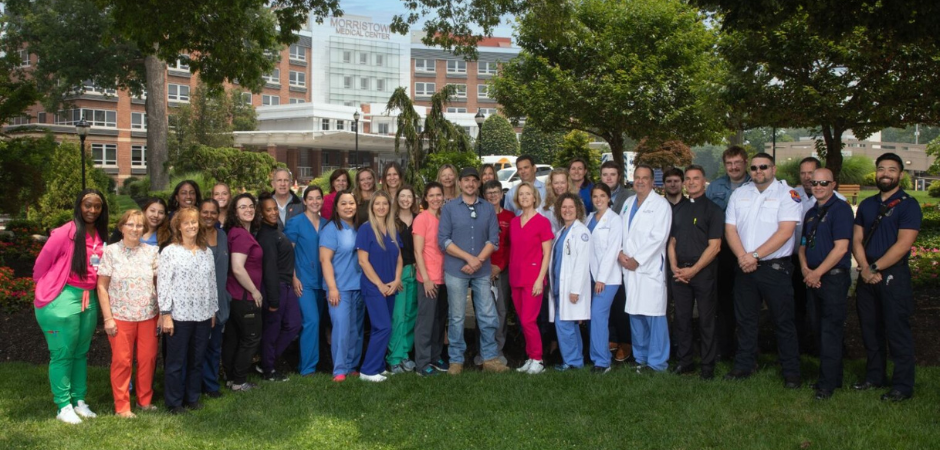Independence Day is supposed to be a day of celebration, but for Cooper Roberts and Ian Azeredo, it was life changing. If it were not for their respective critical care teams, it would have been life ending. Today, both Cooper and Ian are alive and doing well with the help of their care teams, family, and fighting spirit. They are all the recipients of the Society of Critical Care Medicine’s (SCCM) ICU Heroes Award, which recognizes an ICU patient and family and the multidisciplinary team that delivered the care.
Ian Azeredo checked his gear, taking a breath as the airplane rose in altitude. The 32-year-old skydiver thought through the instructions he received, visualizing his target thousands of feet below. His eyes slowly panned around the plane’s inside, fascinated by its structure and design. He checked his gear again. Ian had followed a similar routine more than 700 times before, jumping out of planes, helicopters, and hot air balloons to experience the thrill of flying. Nothing had gone wrong before. But on July 4, 2019, that streak ended. Something went very wrong.

Ian Azeredo recovering in his hospital bed several days after surgery. Photo courtesy of Ian Azeredo. |
A variety of wind factors caused Ian to crash to the ground at 70 miles per hour, shattering his pelvis and fracturing bones throughout his body. “I remember the shock of it,” he said more than four years after the event. “All of a sudden, it starts hitting in. Not only am I hurt, I’m dying. You feel this cold, strange feeling which is kind of like a different sense. You know your body is shutting down.”
Ian was airlifted to the Morristown Medical Center Surgical intensive care unit (ICU) in Morristown, New Jersey, USA. When Louis DiFazio, MD, ICU director, first got a look at Ian, Dr. DiFazio questioned whether Ian would survive the night. “It was a challenge. The odds were clearly against him,” Dr. DiFazio said. “When you first have a patient like Ian who obviously has many life-threatening injuries and you’re not sure if they’re going to survive, it’s all clinical. You don’t focus so much on the person at that point. Some ways to keep the sanity of this job, you need to separate the personal side—the patient, the family—from the clinical things. Otherwise, I don’t think you could go to sleep at night.”
Thanks to Dr. DiFazio and the Morristown ICU team, Ian survived. He was placed in a medically induced coma for more than a month. While his memory of the experience remains hazy, Ian clearly remembers what he thought and said over and over during his initial moments in Morristown. “Please,” he pleaded, “just keep me alive.”
|
CT scan of Ian Azeredo’s shattered pelvis. Photo courtesy of Ian Azeredo. |
Ian described his first time skydiving as a feeling unlike anything he had ever experienced, although fear was most definitely his primary mindset. “It was exciting and terrifying,” he said. “You fill out so much paperwork that you realize this is no joke.” But when he successfully landed on the ground that first time, something changed in him. He thought about that moment, that feeling, for a year before deciding to skydive again.
Soon after, he was hooked. “It’s human flight,” Ian said. “Up there you have these wings that allow you to do whatever you want. There’s this whole different perspective, and I fell in love.” Ian continued to jump, and he began to meet friends with a similar passion. When he met his wife, Linda, he introduced her to skydiving, and soon they were jumping together, building up each other’s confidence as they improved. On the day of his accident, however, Linda was thousands of miles away, enjoying a cruise with family and unaware that her husband was on the brink of death.
The initial obstacle the Morristown team faced was stopping the bleeding around Ian’s pelvis, and the challenge quickly became daunting. “You have to try and get the bleeding to stop, but that process is not very easy,” Dr. DiFazio said. “You can’t take the pelvis out. The bones break, and there is this large network of blood vessels that go through your pelvis. It’s not just a matter of tying those vessels off. It’s a very challenging area, and then you have these unstable bones that are moving. It’s one of the more challenging areas in trauma to get hemostasis, to get that blood under control.”
Ian underwent 12 surgeries and spent 65 days in the ICU, including 43 days on mechanical ventilation. He had multisystem organ failure. His lungs were bruised from the crash and from resuscitation efforts. His liver failed. He had multiple complex open fractures, not just in his pelvis but also in his leg, which became infected. “He was really just touch and go,” Dr. DiFazio said. “The peaks and valleys went on for months.”
 Ian Azeredo (center) and the Morristown Medical Center team. Photo courtesy of Ian Azeredo.
Ian Azeredo (center) and the Morristown Medical Center team. Photo courtesy of Ian Azeredo.
Keely Roberts was with her family on July 4, 2022, at the Independence Day parade in Highland Park, Illinois, USA, when a shooter opened fire on the crowd, killing seven people and injuring dozens, including Mrs. Roberts, who was hit in the leg by a bullet.
But in that moment, as people ducked for cover and desperately fled the scene, Mrs. Roberts put her own pain to the side because her twin eight-year-old sons, Cooper and Luke, were also injured in the attack. Cooper was struck in the chest and abdomen by a bullet, and Luke was hit by shrapnel. It quickly became clear that Cooper’s injuries were life threatening.

Cooper Roberts. Photo courtesy of Keely Roberts. |
“I am someone who is never at a loss for words, and yet I seem unable to find the right words to describe the level of sheer agony my husband and I felt when I thought I lost my son,” Mrs. Roberts said. “As a parent, there is a very raw and primal depth to the level of desperation and sadness you feel that is unlike anything else you will ever experience.”
Cooper also experienced highs and lows, although they occurred at a quicker pace. Soon after the shooting, Cooper was taken to Highland Park Hospital, which is not a pediatric trauma center. He immediately underwent surgery before being helicoptered to University of Chicago’s Comer Children’s Hospital.
Jason Kane, MD, associate medical director of the pediatric ICU, said that the Comer team and the Roberts family would not have received the ICU Heroes award if not for the quick-thinking work performed by the local emergency medical services, emergency department, and surgical teams at Highland Park Hospital. Dr. Kane’s primary focus, when he met Cooper the day after the shooting, was on Cooper’s neurologic examination, during which the team discovered the bullet trajectory had transected Cooper’s spinal cord. Cooper was paralyzed from the waist down.
“The family initially heard a lot about the multiple life-threatening injuries he had,” Dr. Kane said. “We had to then give them additional information about his spinal cord that was certainly devastating. Thank God Cooper is alive, but at the same time, we identified something that may be entirely irreversible.” Cooper’s story quickly gained national attention as he became the latest face of gun violence victims in the United States. Support for the Roberts family came from across the country and around the world. Dr. Kane added, “Although Cooper is certainly a hero and became the face of pediatric gun violence at that time, we must also recognize the heroic strength of all of the pediatric survivors of gun violence from our community we treat in our PICU every day.”
According to Dr. Kane, treating pediatric victims of gun violence has unfortunately become commonplace at Comer Children’s Hospital, which is on the South Side of Chicago, more than 30 miles from the Roberts’s home in the northern suburbs of Chicago. Keely Roberts said her family never wavered in their decision to continue to receive care at Comer Children’s Hospital in spite of the distance. “As a mother of a child whose life lies, literally, in the hands of the PICU care team,” she said, “what it all really boils down to is that you want to know that they are going to treat your child exactly as they would their own. During the absolute worst time in my life, when I had the reason to extend trust the least, I had the absolute most confidence and trust in these people. It was the most impressive example of loving accountability put into action I have ever seen in my life.”

Cooper Roberts boxing during physical therapy. Photo courtesy of Keely Roberts. |
That love was a constant between the care Cooper Roberts and Ian Azeredo received. For Cooper, it was the Comer team’s openness to include the family in morning rounds and provide added care for Cooper’s twin, Luke, who showed signs of emotional distress and survivor’s guilt.
For Ian, it was the communal bond displayed by everyone on his care team, including physicians and nurses as well as the workers who meticulously cleaned his room. Ian had multiple breakthroughs on his road to recovery. He developed pericardial tamponade that was preventing his liver from recovering. Once the fluid was drained, Ian’s condition began to improve. His mentality on the road to recovery was simple: Make today not be quite as bad as yesterday. “There were only some things I could control, and I realized quickly that worrying about things I couldn’t control was exhausting,” Ian said. “In order to get better, I had to manage my energy.”
Ian’s other major breakthrough came after being discharged. His left leg had little function remaining. His care team debated whether it should be amputated, but Ian said no. He later received a hydraulic exoskeleton device that is placed over the leg to help him walk.
Cooper and his family have adjusted to their new reality. Cooper spent nearly a month in the hospital. Now using a wheelchair, Cooper has returned to school and is living life as normally as he can. “Our entire family is doing as well as we probably could be doing, given all that has happened,” Keely Roberts said. “Some days are a lot easier than others, but we all feel really grateful that we are still here, together.”
They are also grateful for their care team at Comer and are proud to receive the SCCM ICU Heroes Award along with the team. “It is so special because it memorializes for me that we fought side by side with this group of incredible people who are family to us now, all for Cooper,” she said. “This award is about honoring the power of good over evil, the power of love winning over all else.”
For Dr. Kane, who had a front row seat for Cooper’s care and recovery, the award represents what effective critical care looks like. “When I think about critical care and the goal of SCCM’s ideas of transitions of care, Cooper’s story, as tragic as it is, exemplifies how successful transitions in critical care can lead to optimal outcomes,” he said. “Looking at the whole thing holistically, this is the perfect example of everything going as right as it could, from the sidewalk in Highland Park to the emergency department, to the operating rooms, to the helicopter ride across the city, to Comer Children’s Hospital and the PICU. These seamless transitions across the critical care spectrum gave us the best opportunity for an optimal outcome.”
 Cooper Roberts (right) and his twin brother Luke (left). Photo courtesy of Keely Roberts.
Cooper Roberts (right) and his twin brother Luke (left). Photo courtesy of Keely Roberts.










